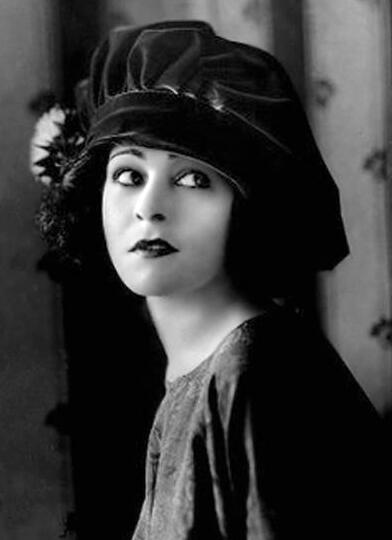Alla Nazimova (Adelaida Yakovlevna Leventon)

Alla Nazimova’s theater career blossomed early; and by 1903 she was a major star in Moscow and Saint Petersburg. She toured Europe, including London and Berlin, with her boyfriend Pavel Orlenev, a flamboyant actor and producer. In 1905 they moved to New York City and founded a Russian-language theater on the Lower East Side. The venture was unsuccessful; and Orlenev returned to Russia while Nazimova stayed in New York. She was signed up by the American producer Henry Miller and made her Broadway debut in New York City in 1906 to critical and popular success. Her English-language premiere in November 1906 was in the title role of Hedda Gabler. She quickly became extremely popular (a theater was named after her) and remained a major Broadway star for years, often acting in the plays of Henrik Ibsen and Anton Chekhov. Dorothy Parker described her as the finest Hedda Gabler she had ever seen. Due to her notoriety in a 35-minute 1915 play entitled War Brides, Nazimova made her silent film debut in 1916 in the filmed version of the play, which was produced by Lewis J. Selznick. A young actor with a bit part in the movie was Richard Barthelmess, whose mother taught Nazimova English. Nazimova had encouraged him to try out for movies and he later became a star. In 1917, she negotiated a contract with Metro Pictures, a precursor to MGM, that included a weekly salary of $13,000. She moved from New York to Hollywood, where she made a number of highly successful films for Metro that earned her considerable money. In 1927, she became a naturalized citizen of the United States.
Alla Nazimova soon felt confident enough in her abilities to begin producing and writing films in which she also starred. In her film adaptations of works by such notable writers as Oscar Wilde and Ibsen, she developed her own filmmaking techniques, which were considered daring at the time. Her projects, including A Doll’s House (1922), based on Ibsen, and Salomé (1923), based on Wilde’s play, were critical and commercial failures. By 1925 Nazimova could no longer afford to invest in more films; and financial backers withdrew their support. Left with few options, she gave up on the film industry, returning to perform on Broadway, notably starring as Natalya Petrovna in Rouben Mamoulian’s 1930 New York production of Turgenev’s A Month in the Country and an acclaimed performance as Mrs. Alving in Ibsen’s Ghosts, which the critic Pauline Kael later described as the greatest performance she had ever seen on the American stage. In the early 1940s, she appeared in a few more films, playing Robert Taylor’s mother in Escape (1940) and Tyrone Power’s mother in Blood and Sand (1941). This late return to motion pictures fortunately preserves Nazimova and her art on sound film. On July 13, 1945 Alla Nazimova died of a coronary thrombosis, age 66, in the Good Samaritan Hospital in Los Angeles. Her ashes were interred in Forest Lawn Memorial Park Cemetery in Glendale, California. Her contributions to the film industry have been recognized with a star on the Hollywood Walk of Fame.
Born
- June, 03, 1879
- Yalta, Crimea, Russian Empire
Died
- July, 13, 1945
- USA
- Los Angeles, California
Cause of Death
- coronary thrombosis
Cemetery
- Forest Lawn Memorial Park (Glendale)
- Glendale, California
- USA



